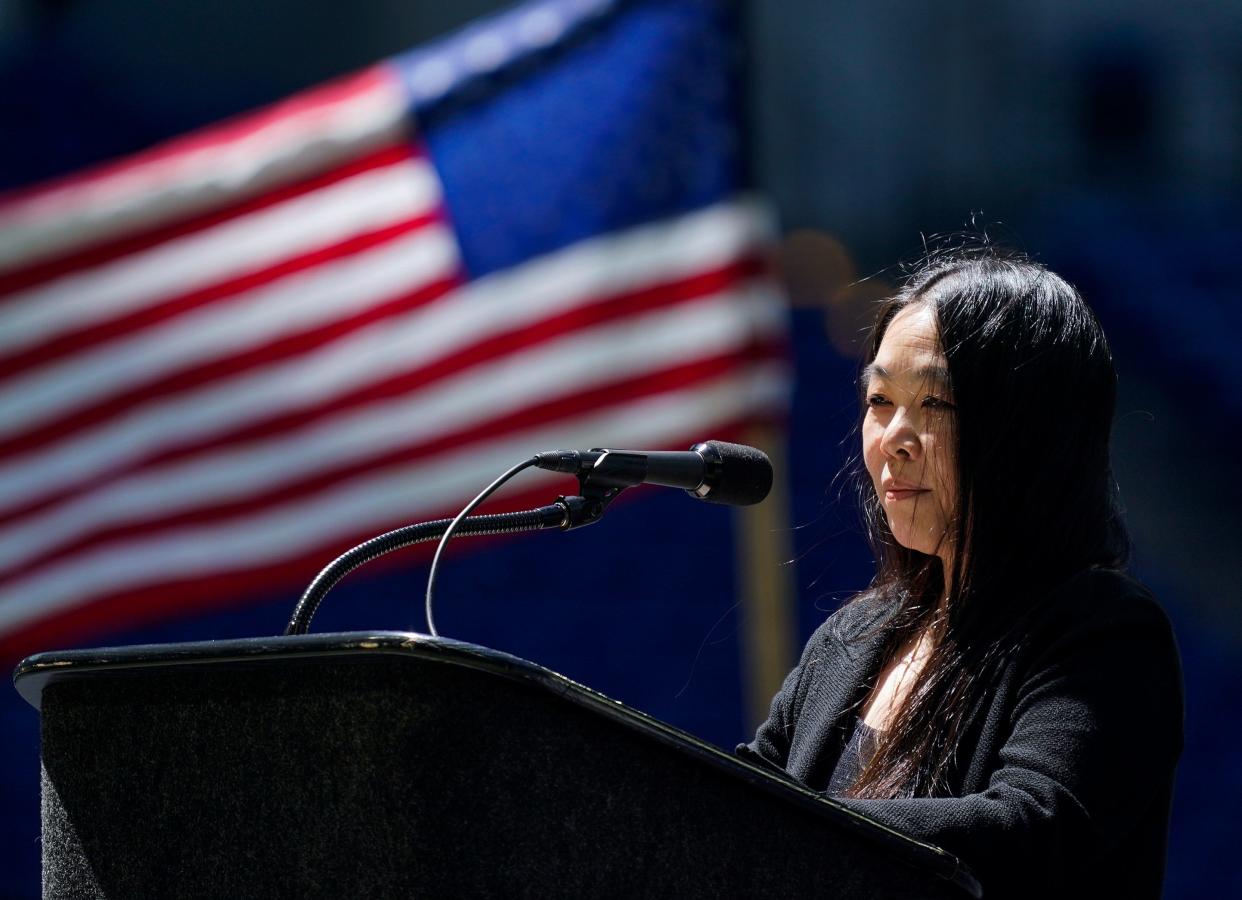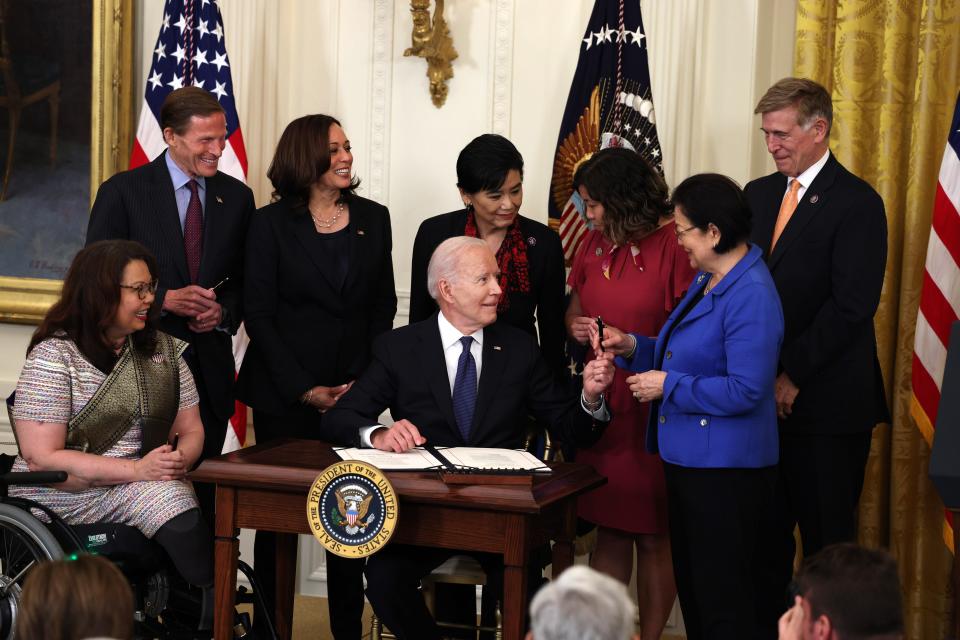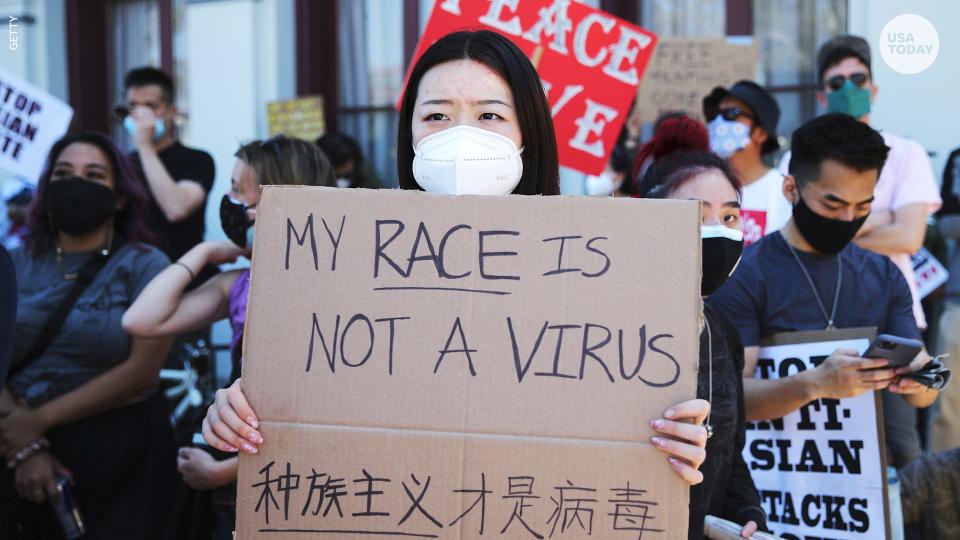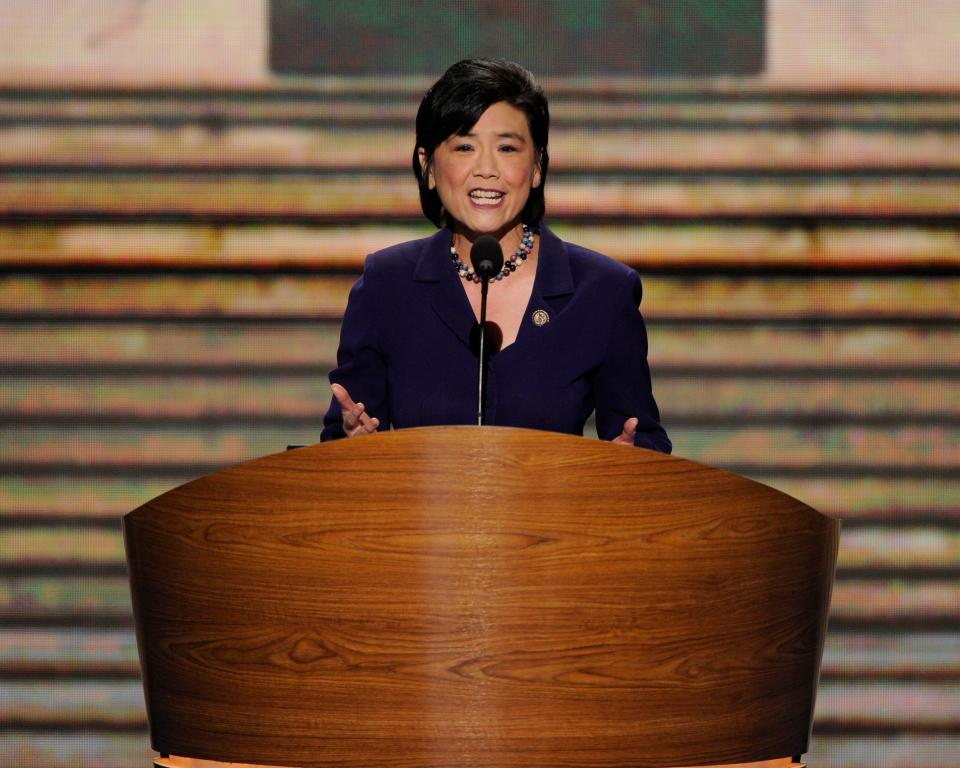‘A walking briefing book’: How Biden adviser Erika Moritsugu quietly champions AAPI priorities

- Oops!Something went wrong.Please try again later.
WASHINGTON – In the weeks since she was named White House Asian American and Pacific Islander senior liaison, Erika Moritsugu has quietly moved through the West Wing, tackling everything from an increase in attacks on Asian Americans to India's spiraling COVID-19 crisis.
Though the issues she's working on have dominated national headlines, Moritsugu has managed to stay out of the spotlight as she settles into a nebulous role that requires constant coordination with an exhaustive list of congressional offices, executive agencies, policy councils, communication teams and the first and second couples' offices.
Even her high-profile appointment – which came after two AAPI Democratic senators threatened to block the president's nondiverse nominations over frustrations over the lack of AAPI representation in the Cabinet – was announced with little fanfare.
A yearlong spike in violence targeting people of Asian descent has heightened discussions of prioritizing AAPI inclusivity at the highest levels of government, culminating in a rare, bipartisan moment in which President Joe Biden signed the first federal hate crimes law in 12 years, designed to address attacks on Asian Americans during the coronavirus pandemic.
Administration officials, advocates and former colleagues said Moritsugu has provided a much-needed lifeline for AAPI groups and eased into the newly created role, in part because of her experience as a seasoned hand straddling the nonprofit and government worlds.
Moritsugu conceded her career has been anything but linear but described her appointment as a "culmination of a lot of different little pinpoints in my biography and professional and volunteer experience."
"It's something that honestly I've done de facto my whole career," she told USA TODAY. "By being maybe the only Asian American in a mainstream dominant culture room and finding my own voice and successes that way."
The Hawaii native's most recent stints include executive roles at the National Partnership for Women and Families and the Anti-Defamation League. Moritsugu served as general counsel for Sen. Tammy Duckworth, D-Ill.; assistant secretary for congressional and intergovernmental relations at the Department of Housing and Urban Development under the Obama administration – a Senate-confirmed position – and an aide for Sen. Daniel Akaka, D-Hawaii.
"She's like a walking briefing book. She has a gift for moving between issues like civil liberties, minority concerns, to broader national security concerns," said Jonathan Greenblatt, CEO of the ADL and a former Obama White House adviser. "She's a lawyer, so she has the legal perspective. She's drafted legislation, but she's also got real political chops, so she's in a role at the White House where she's able to flex all those muscles."
AAPI pride: Asian and Pacific Islander heritage helps lift America to what it must be
Asian American legal groups look to Supreme Court as they pursue path to make history
Balancing a ‘battle rhythm of activities’
Moritsugu understands that her role comes without a playbook, which leaves room for both experimentation and error.
"It's been energizing and affirming because we're building something in a world without rules and examples and high expectations," she said. "It's an experiment, but I have such a nontraditional career background in so many different areas and sectors, so I have a lot of examples to draw from, a strong network of allies and critics to learn from and a pretty good strategic sense of how the competing interests and multiple opportunities can be interplayed."
Moritsugu spent her first weeks at the White House packing in dozens of events to mark AAPI Heritage month, describing it as a "battle rhythm of activities," including 10 speaking engagements with community leaders and groups, meetings with members of Congress and their staff and building out her own team to help with her broad mission of managing policy, politics and engagement with the AAPI community. She sat in on meetings with the Congressional Asian Pacific American Caucus in the Oval Office and with Vice President Kamala Harris.
She spoke about AAPI representation in government to the Attorney General's Alliance, co-hosted by Connecticut Attorney General William Tong and District of Columbia Attorney General Karl Racine, as well as to the AAPI Chamber of Commerce during Small Business Week. After a shooting at a FedEx facility in Indianapolis left eight people dead, including four members of the Sikh community, she delivered and read aloud a letter of support from Biden.
Moritsugu, whose office is in the West Wing, sits in on senior staff daily meetings attended by the president's top aides such as chief of staff Ron Klain, Mike Donilon, Bruce Reed, Anita Dunn, Steve Ricchetti and Cedric Richmond, according to a White House official who spoke on condition of anonymity.
AAPI tensions at the White House
Her role has taken on prominence as Biden looks to deliver on his Day One promise of advancing racial equity across the federal government and appointing a Cabinet that "looks like America."
U.S. Trade Representative Katherine Tai is the only Asian American to serve in the Cabinet, but her position is not secretary level. Though the Biden administration made history with the first female, Black and South Asian vice president, the first Black defense secretary, the first openly gay Cabinet member and the first Native American secretary, the president's Cabinet is the first in more than 20 years to not include at least one AAPI secretary.
Tensions over an absence of AAPI nominees spilled into public view in March when Duckworth – Moritsugu's old boss – and Sen. Mazie Hirono, D-Hawaii, vowed to vote against Biden's "nondiversity" nominees after the senators said their push for greater AAPI representation was ignored.
Their concerns were set against the backdrop of a string of shootings at Atlanta spas, in which six of the eight people killed were women of Asian descent, leaving the AAPI community feeling shocked, vulnerable and outraged at what some saw as a lack of protection.

The two senators backed down after the White House agreed to appoint a liaison.
The White House also appointed senior adviser Neera Tanden, who withdrew her nomination to lead the Office of Management and Budget after facing Republican opposition, and Biden signed an order to reauthorize the White House Initiative on AAPIs and appointed Krystal Ka’ai, executive director of the Congressional Asian Pacific American Caucus, to lead the program.
Biden has yet to name his pick to replace Tanden as OMB director. AAPI groups are pushing the president to consider Nani Coloretti, who served as deputy secretary for HUD under President Barack Obama. Deputy Director Shalanda Young serves as the acting director of the OMB.
"That's the last Cabinet-rank position left, so we'll be paying attention," said Shekar Narasimhan, a longtime Democratic fundraiser and chairman of the AAPI Victory Fund, a super PAC focused on mobilizing Asian Americans and Pacific Islanders.
Narasimhan said the administration has been "unbelievably responsive" to groups advocating for assistance with India's COVID-19 crisis, both in his own calls to the West Wing and for others.
In April, as the administration faced mounting pressure to play a bigger role as India's crisis worsened, Narasimhan told White House officials they needed to hold an event to directly tell the community how they were mobilizing assistance.
Moritsugu helped organized an event with national security adviser Jake Sullivan and Surgeon General Vivek Murthy within a day, he said. By the week's end, Harris, whose mother immigrated to the USA from southern India, delivered remarks to members of the Indian diaspora at the State Department.
Moritsugu said that after conversations with South Asian friends about the situation in India and as news articles from abroad verified some of the horror stories, she acted.
"People wanted to know how help and what the government was planning on doing, and I was a natural point of entry for folks to call upon," Moritsugu said. "In seeking the right avenues internally for answers, I met or was reunited with new colleagues in the agencies, on the president’s team or in the vice president’s office who were poised to be helpful."
Her accessibility, along with Howard Ou, an associate director at the White House Office of Public Engagement who handled AAPI relations before her arrival, has been critical, according to Narasimhan.
"This is one tough, strong, extremely organized person, so I expect wonders here," Narasimhan said of Moritsugu. "It is extremely important to have somebody in the White House who understands our issues, knows the need for representation and understands the value of optics and then what can happen behind it."
Some of those optics include recognizing AAPI communities that have largely been overshadowed, including the country's estimated 4 million Buddhists. Last month, second gentleman Doug Emhoff led the first White House celebration of Vesak, a 2,500-year-old holiday celebrating the enlightenment of Buddha – an event organized by Moritsugu.
A rise in anti-Asian hate
Perhaps the most confronting AAPI challenge before the White House is grappling with a rise in anti-Asian attacks during the pandemic, a grim statistic that was thrust into the national spotlight after the shootings in Atlanta and Indianapolis.
More than 6,600 anti-Asian hate incidents have been reported in the year since the pandemic arrived in the USA, according to Stop AAPI Hate, a nonprofit group that tracks incidents of hate and discrimination against Asian Americans and Pacific Islanders.
As a result, Congress moved to pass the COVID-19 Hate Crimes Act, which Biden signed into law last month during a White House ceremony attended by nine AAPI members of Congress, community advocates, surviving family members of two victims of hate crimes that the NO HATE Act was named for and more than a dozen AAPI appointees and career staff.

After the ceremony, Moritsugu facilitated a meeting with Biden and Harris and AAPI community leaders, including members of the Asian American Foundation, an initiative launched in May and backed by the ADL.
Democrats contended the spike in hate crimes is linked to President Donald Trump's rhetoric blaming China for the pandemic, as well as his labeling of COVID-19 as the "China virus."
Though Biden signed an executive order denouncing anti-Asian discrimination after taking office in January, his own framing of foreign and domestic policy as a competition with China has left some advocates wary that language at the White House could contribute to the persistent problem.
"We are in a competition with China and other countries to win the 21st century," Biden declared in his first joint address to Congress.

The president asked his intelligence community to report within 90 days on the origins of COVID-19, reviving a theory that flourished during the Trump administration that the virus was the result of an accident in a Chinese laboratory.
Advocacy groups said the White House has been open to conversations on the sensitivities around vocabulary.
Albert Shen, board member of the Asian American Action Fund and a former Obama administration official who worked with Moritsugu, said the Biden administration has kept an open dialogue – a marked contrast from the Trump administration, which he said "completely ignored" concerns.
AAPI ‘unicorn’
Though Moritsugu has been largely invisible in some of the high-profile moments at the White House, advocates said she's played an important role in driving diversity and inclusion – a mission she said informed her long career in Washington.
"She may be invisible, especially publicly or on camera, but her knowledge of the levers of government and her ability to navigate and be that influencer inside is something she knows well," Shen said. "It takes a certain personality and she knows how to do that."

Outside her day job, Moritsugu mentors Asian American and Native Hawaiian and Pacific Islander women and has spent a lot of time working on voter protection rights in Georgia, according to Lelaine Bigelow, a former colleague at the National Partnership for Women and Families who's worked on and off with Moritsugu since their days on Capitol Hill.
Among her strongest assets are relationships on the Hill, where she holds calls or meetings with congressional members and their teams at least a couple of times a week. Several advocates and former colleagues pointed to her warm relationships with Duckworth, Hirono and Reps. Judy Chu, D-Calif., and Grace Meng, D-N.Y. Duckworth and Moritsugu have spoken several times since her appointment, according to a Duckworth spokesperson.
"She's a known entity. There's already an establishment of trust and credibility that she doesn't have to work toward," Bigelow said. "Her different roles in Washington have shown she can be successful while at the same time experiencing racism and discrimination. She knows where the implicit bias hides and how to root it out and how to fix it through the process because she's been steeped in it for so long."
Now that AAPI Heritage month is behind her, Moritsugu has her eye on a number of administration priorities in the months ahead: pitching Biden's American Jobs Plan and American Families Plan, vaccine confidence, immigration, establishing an AAPI women stakeholder group and tackling the economic challenges facing AAPI small businesses from COVID-19 – all issues that advocates say she's well-equipped to handle.
As someone who knows civil rights through her work in the nonprofit world, who's worked for multiple members of Congress and served in the Obama administration, Greenblatt said she's the perfect fit for the job.
"She's deeply embedded in not just the Asian American community but the Pacific Islander community as well," Greenblatt said, noting her Hawaiian heritage. "She's kind of a unicorn on these issues in a way that's really special."
This article originally appeared on USA TODAY: Erika Moritsugu: Biden top adviser quietly champions AAPI priorities

